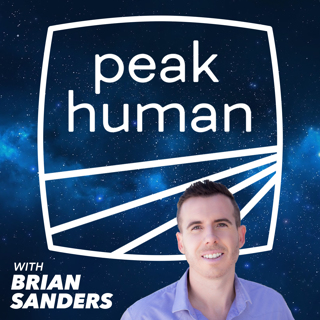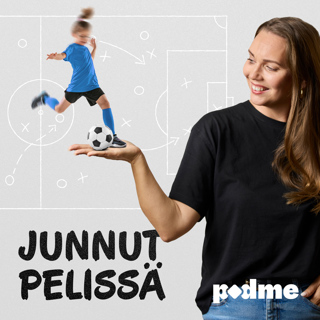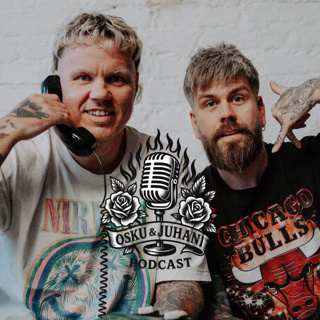
Part 217 - Stephan van Vliet on the Hidden Health Benefits of Red Meat
Stephan van Vliet, PhD, is a distinguished researcher specializing in nutritional metabolomics at the Center for Human Nutrition Studies at Utah State University. He is widely recognized for his groundbreaking work in identifying and analyzing over 50,000 bioactive secondary compounds in meat. Dr. van Vliet's research emphasizes the nutritional and environmental implications of these compounds, particularly their roles in human health and disease prevention. His work challenges conventional dietary recommendations by highlighting the complex nutrient profile of meat and its potential benefits beyond primary nutrients. His contributions to the field have been published in numerous esteemed scientific journals, making significant impacts on our understanding of diet and health. SHOW NOTES 01:10 Introduction to the Center for Human Nutrition Studies 02:07 Exploring Nutrition Studies and Grass-Fed Beef Research 03:03 Collaborations and Mentorship in Nutrition Science 04:46 The Impact of Diet on Human Health: A Deep Dive 18:40 The Complexity of Food and Its Nutritional Value 36:53 Regenerative Agriculture and Its Economic Implications 42:47 Debunking Processed Meat Myths 43:43 The Surprising Health Benefits of Traditional Meats 47:30 Nutrient Density and Satiety: The Protein Leverage Hypothesis 48:44 Exploring the World of Secondary Compounds 52:21 The Power of Whole Foods: Simple Yet Effective 54:32 Personalizing Nutrition: One Size Does Not Fit All 01:10:31 The Height and Health Connection: A Global Perspective 01:14:41 Regenerative Agriculture: Beyond the Hype 01:21:52 Concluding Thoughts: Accessibility and Health
9 Touko 20241h 17min

Part 216 - Mollie Englehart Makes All Her Vegan Restaurants Animal Based
In this enlightening episode, we dive deep into Mollie Engelhart's transformative journey from a lifelong vegan upbringing to embracing regenerative agriculture and modifying her Los Angeles restaurant, Sage Bistro, to incorporate regenerative meat. Engelhart shares her compelling story, backed by her experience as both a regenerative farmer and a vegan chef, highlighting the environmental, nutritional, and ethical considerations that led to her pivotal shift. This discussion not only sheds light on the practical aspects of sustainable farming and the impact of dietary choices on personal health and the environment but also illustrates Engelhart's commitment to nutrient-dense food production and her vision for the future of sustainable dining. REGENERATIVE PRODUCTS: NosetoTail.org Preorder the film here: http://indiegogo.com/projects/food-lies-post SHOW NOTES 02:33 Molly Engelhardt's Big Announcement: A Vegan Restaurateur's Shift to Regenerative Practices 04:11 The Realities of Veganism and the Importance of Animal Nutrition 14:58 Molly's Personal Journey: From Veganism to Regenerative Farming 22:29 Raising a Family on a Regenerative Farm: Diverse Diets and Health Insights 22:49 Adopting a Regenerative Lifestyle: Osmar's Story 28:36 Navigating Beliefs and Changing Perspectives: A Conversation on Food, Health, and Society 34:16 Celebrating Earth Day with Regenerative Agriculture 34:21 The Common Ground of Soil Health 35:30 The Impact of Big Ag and Big Pharma on Agriculture 36:13 The Harsh Realities of Monocropping 38:07 Embracing Regenerative Farming Practices 44:41 The Journey from Veganism to Regenerative Agriculture 44:42 Traditional Diets and Dental Health 57:07 The Dangers of Processed Foods and the Benefits of Whole Foods 01:05:17 Fermentation: Unlocking Nutritional Value in Indigenous Diets 01:06:40 Reflecting on Modern Diets and the Genius of Human Adaptation 01:07:44 Announcing the New Regenerative Kitchen Concept REGENERATIVE PRODUCTS: NosetoTail.org Preorder the film here: http://indiegogo.com/projects/food-lies-post Film site: http://FoodLies.org YouTube: https://www.youtube.com/c/FoodLies Follow along: http://twitter.com/FoodLiesOrg http://instagram.com/food.lies http://facebook.com/FoodLiesOrg
24 Huhti 20241h 8min

Part 215 - Jason Karp on How to Cure Incurable Diseases with Diet
This podcast episode, featuring host Brian Sanders and entrepreneur Jason Karp, delves into Jason's personal health journey of overcoming incurable blindness through dietary changes. It critically examines the negative impacts of the industrial food system on both human health and the environment, spotlighting deceptive practices by major food corporations like Kellogg's. The conversation advocates for a shift towards consuming less processed foods, supporting regenerative agriculture, and making informed food choices for sustainable living. REGENERATIVE PRODUCTS: NosetoTail.org Preorder the film here: http://indiegogo.com/projects/food-lies-post SHOW NOTES 00:00 Welcome to Peak Human & Introduction to Jason Karp's Journey 02:47 Jason Karp's Health Transformation Through Diet 09:04 The Sapien Thesis: Unveiling the Metacrisis of Modern Society 22:11 The Power of Nature and Ancestral Wisdom in Healing 30:14 Challenging Modern Food Systems and Embracing Regenerative Agriculture 34:38 The Importance of Community, Love, and Returning to Human Fundamentals 38:02 Rediscovering Human Roots for Happiness 38:36 Aligning with Nature in Modern Society 40:14 The Journey from Cyborg to Balanced Human 40:39 Leveraging vs. Aligning with Nature 41:29 Creating Healthier Food Alternatives 43:40 Human Co: Revolutionizing Food with Health in Mind 46:55 The Power of Regenerative Farming 48:40 Challenging the Ultra-Processed Food Paradigm 56:03 The Economics of Healthy Eating 01:03:22 Taking Action Against Unhealthy Food Practices 01:09:59 Personal Health Miracles Through Diet BUY THE MEAT NosetoTail.org Preorder the film here: http://indiegogo.com/projects/food-lies-post Film site: http://FoodLies.org YouTube: https://www.youtube.com/c/FoodLies Follow along: http://twitter.com/FoodLiesOrg http://instagram.com/food.lies http://facebook.com/FoodLiesOrg
18 Huhti 20241h 12min

Part 214 - You Can't Cheat Nature
Drako, an international entrepreneur, nutrition advocate and partner at Nose to Tail, champions a diet centered on whole natural foods, emphasizing their crucial role in optimal health. He is the co-founder of the Sapien Center and the Sapien Movement, a community organization focused on human health and thriving. After solving multiple chronic health conditions through nutrition and lifestyle methods, he now promotes the use of nutrient-dense foods to combat chronic diseases and insulin resistance. Beyond the health sector, Drako has made significant strides in the financial world as CEO of the African fintech company Kuva.com. His diverse expertise reflects a commitment to enhancing human health and wealth in the modern world. Get on the waitlist for the Sapien Community Organization Sapien.org BUY THE MEAT NosetoTail.org Preorder the film here: http://indiegogo.com/projects/food-lies-post SHOW NOTES (05:16) One of the keys to longevity among those living in "Blue Zones" are their tight-knit communities and strong sense of personal identity, more than just their nutrition. (11:27) Longevity is not just the amount of years you live, but the quality of experiences and that throughline of purpose in your life. (20:59) Avoid eating plants with vigor-altering chemicals, which become gut irritants that poison the body over time. Such chemicals exist as a defense mechanism to prevent the over-eating of these plants. (29:48) Whatever is in your body is there for a reason, in accordance with nature. BUY THE MEAT NosetoTail.org Preorder the film here: http://indiegogo.com/projects/food-lies-post Film site: http://FoodLies.org YouTube: https://www.youtube.com/c/FoodLies Follow along: http://twitter.com/FoodLiesOrg http://instagram.com/food.lies http://facebook.com/FoodLiesOrg
11 Huhti 202447min

Part 213 - Escape the Matrix of Modern Society
Drako, an international entrepreneur, nutrition advocate and partner at Nose to Tail, champions a diet centered on whole natural foods, emphasizing their crucial role in optimal health. He is the co-founder of the Sapien Center and the Sapien Movement, a community organization focused on human health and thriving. After solving multiple chronic health conditions through nutrition and lifestyle methods, he now promotes the use of nutrient-dense foods to combat chronic diseases and insulin resistance. Beyond the health sector, Drako has made significant strides in the financial world as CEO of the African fintech company Kuva.com. His diverse expertise reflects a commitment to enhancing human health and wealth in the modern world. Sapien.org BUY THE MEAT NosetoTail.org Preorder the film here: http://indiegogo.com/projects/food-lies-post SHOW NOTES (06:16) Commercial food is not necessarily healthy food. (17:03) The Haber–Bosch process has resulted in a population explosion, but our current food supply now depends on synthetic resources to sustain itself as a result. (30:33) You can't cheat nature. (36:06) When you prioritize energy-dense foods over nutrient-dense foods, your body will be left starving for more even as it gets fatter and sicker. (46:50) What serves the structure does not serve the individual. BUY THE MEAT NosetoTail.org Preorder the film here: http://indiegogo.com/projects/food-lies-post Film site: http://FoodLies.org YouTube: https://www.youtube.com/c/FoodLies Follow along: http://twitter.com/FoodLiesOrg http://instagram.com/food.lies http://facebook.com/FoodLiesOrg
28 Maalis 20241h 4min

Part 212 - Dr. Ted Naiman & Dr. Andreas Eenfeldt on How to Not Overeat
Dr. Ted Naiman is a distinguished physician recognized for his contributions to the field of health and wellness. With a background in family medicine and bariatric medicine, Dr. Naiman has built a reputation for his innovative patient care approaches, focusing on lifestyle interventions for chronic disease management. He is the author of several influential publications and a sought-after speaker at health conferences worldwide. His groundbreaking work in nutritional health has positioned him as a key thought leader in the medical community. http://tednaiman.com Dr. Andreas Eenfeldt is a highly esteemed medical professional and a pioneer in the digital health space. He has garnered widespread acclaim for his work in simplifying complex medical concepts for the general public, particularly through his influential health website. Dr. Eenfeldt's commitment to patient education and empowerment has made a significant impact, evidenced by the large online community he has built. As a speaker and author, he continues to contribute to important discussions on health and wellness, inspiring a global audience. http://dietdoctor.com and Their new project: http://hava.co
20 Maalis 20241h 8min

Part 211 - The #1 Trick To Not Get Fat - From Acclaimed Scientists Raubenheimer & Simpson
Dr. Stephen J. Simpson and Dr. David Raubenheimer are renowned scientists known for their work in the field of nutritional ecology. Their research primarily focuses on understanding how organisms, including humans, regulate their intake of nutrients and how this affects their health and behavior. Dr. Stephen Simpson is an Academic Director of the Charles Perkins Centre and a Professor in the School of Life and Environmental Sciences at the University of Sydney. His research has spanned several disciplines, from studying locusts to human obesity, and he has been influential in developing the field of nutritional ecology. Dr. David Raubenheimer, also affiliated with the University of Sydney, holds the Leonard P. Ullmann Chair in Nutritional Ecology. His research involves the study of nutrition and its effects across a wide range of species, including humans. He has worked extensively on the concept of nutritional geometry, which is a framework for understanding how animals and humans make decisions about what and how much to eat. Together, Simpson and Raubenheimer developed the "Protein Leverage Hypothesis," which suggests that the protein content of the diet can strongly influence total energy intake and thus has significant implications for understanding obesity. Their collaborative work has been pivotal in highlighting the complex interactions between diet composition, appetite, and health, making significant contributions to both basic biology and implications for human health and nutrition. BUY THE MEAT NosetoTail.org Preorder the film here: http://indiegogo.com/projects/food-lies-post SHOW NOTES: (08:00) Every species studied in their natural, undisturbed environments thrive in their nutritional balance. (16:32) The protein leverage hypothesis (see study: https://pubmed.ncbi.nlm.nih.gov/22022472/#:~:text=The%20'protein%20leverage%20hypothesis'%20proposes,promote%20the%20development%20of%20obesity.) posits that we have a preference for protein over other macronutrients, and that the amount of protein we consume influences our appetite for carbs and fats afterwards. (28:07) Eating more, per se, isn't the problem. It's when that food is higher in energy density than fiber that leads to overeating and, by extension, obesity. (38:58) Much of the fruit we eat is not entirely natural due to the modification they go through in farms. (46:02) Over time, our bodies have adapted to thrive in the environment in which human beings find themselves. Today, we continue to adapt, but not necessarily for the better. (54:18) Even our circadian biology has been shaken up through modern sleep patterns and our supplementation with sleep pills and caffeine. BUY THE MEAT NosetoTail.org Preorder the film here: http://indiegogo.com/projects/food-lies-post Film site: http://FoodLies.org YouTube: https://www.youtube.com/c/FoodLies Follow along: http://twitter.com/FoodLiesOrg http://instagram.com/food.lies http://facebook.com/FoodLiesOrg
6 Maalis 202458min

Part 210 - Nora Gedgaudas on Animal-Based Diets & Eating Off the Ground For Health
Nora Gedgaudas is a renowned nutritionist and author, recognized for her expertise in the Paleo diet and ancestral health. She advocates for a nutrient-dense diet, emphasizing the importance of whole foods, healthy fats, and proteins for optimal health and well-being. Nora's work blends modern nutritional science with evolutionary biology, offering a unique perspective on diet and wellness. She is a sought-after speaker and consultant, inspiring individuals to adopt lifestyle changes for long-term health benefits. Discover more about her philosophy and access a wealth of resources at her website: www.noragedgaudas.com.
6 Joulu 20231h 9min





















